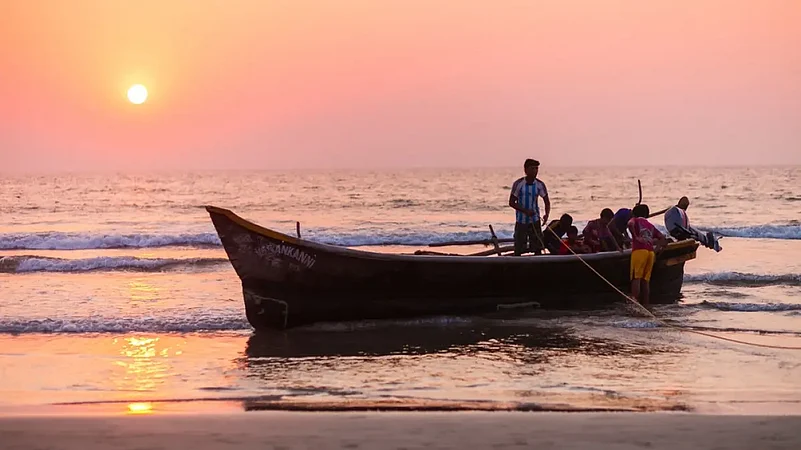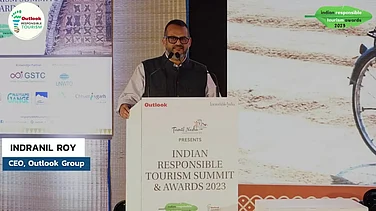Multiple boats crowd the bobbing waters as heads pop up to peer far into the sea, searching for an elusive denizen of the deep - the Indian Ocean Humpback Dolphin. They come, often sinking back into the waters as quickly as they appeared, due to the presence and noise of the motor boats filled with tourists. An unfortunate chase of the dolphins ensues, propelled by the operators’ promises of a sighting and the loss of money if their sea venture returns fruitless.

The Indian Ocean Humpback Dolphin (Sousa Plumbea) are a coastal species of dolphins organised in small, matriarchal family groups called ‘pods’. They are very social mammals and expert river mouth hunters. They are residential to Goa’s near shore waters which has led to a proliferation of boat operators who offer ‘guaranteed’ dolphin sightings across the coast, particularly in Sinquerim bay. But these budget tours weren't without any repercussions.
Advertisement
“A study conducted by the World Wide Fund for Nature - India, supported by the International Union for Conservation of Nature, India stated that during observation surveys, dolphins were observed displaying signs of stress around the tour boats, including avoidance behaviour and changing path of travel. The root cause of the issue is lack of awareness and capacity building, and lack of rules and guidelines issued and enforced by the concerned authorities,” says Puja Mitra, who founded Terra Conscious in 2017 with her husband Roshan Gonsalves, with a vision to mainstream responsible tourism, enable support for local livelihoods and conservation action.
Advertisement

Goa is popularly perceived as India’s party destination; cheap alcohol, accommodation and an ambience that is blinding in its brilliance is enough to sell it as the kingdom of good times. But the cacophonous shores and their obvious charm often hide the impacts of mass commercial tourism on this small coastal state. The marine biodiversity of the state, found across Goa’s 160km coastline, with coral reefs, mangroves and fauna are all under direct threat from irresponsible tourism, unplanned development and climate change. Terra Conscious works with local communities by providing knowledge and market support and raising awareness amongst visitors about these challenges, to address some of these impacts.
Headquartered in North Goa, they offer, in partnership with local operators, an example of how a responsible marine wildlife watching experience could be conducted, keeping with internationally accepted guidelines. This is enabled through their Boat Operator Partnership Programme. They ensure that the boat is always parallel to the direction the dolphin is moving in, keeping a safe distance so as to not cut the animal’s path. They also make sure boat operators turn off the boat engine so as to maintain an environment of silence that allows the animals to engage in their natural behaviours without disturbance.

Advertisement
“We started our Boat Operator Partnership Programme to help improve the livelihoods of the operators and offer tourists a responsible experience, which helps to transform the existing format of trips into being more ethical and wildlife friendly and raise awareness about marine conservation,” explains Mitra. Her passion is palpable. She played a key role in a national campaign that had led to the ban on establishment of dolphinaria (dolphin circuses) in India, pivoting her towards marine conservation. Led by a professional, Terra’s dolphin watching experience comes with an opportunity to learn about these lesser known marine species found in Goa. Sustainable and positive outcomes of the initiative so far have shown that their model reduces the stress and disturbance faced by the dolphins during such excursions as well as enables better monitoring of the species with greater focus on their well-being.
Advertisement
It Is All Connected

Goa boasts of a rich biodiversity pool; six species protected under Schedule I of the Wildlife Protection Act of India, 1972 are found in the state - the Indian Ocean Humpback Dolphin, Finless Porpoise, Olive Ridley Sea Turtle, Coral Reefs, Indian Mugger (crocodile) and Mangrove Forests. However, a determined push for increased concrete development on the coast to enable industry, tourism, etc has put Goa’s environment and economic growth at loggerheads. “The sand dunes have been flattened for hotels, restaurants; everyone is constantly trying to do everything on the fragile beaches, from large scale accommodations, events to restaurants, without taking into account the impact it has on the local wildlife, habitats and local communities,” explains Mitra.
Advertisement
Ecological welfare and wildlife conservation in Goa are concerns that have been addressed by local communities for decades and much of what one can still experience today in terms of forests, lakes, rivers, beaches and coastal waters in the state is because of the efforts of local people to protect their biodiversity and local heritage. Conservation is holistic and in a coastal state like Goa, it often starts with its best and natural climate defence ecosystem - the Mangrove Forests.

Mangroves are tropical trees that thrive in the brackish intertidal zone of the coast amidst the inevitable ebb and flow of the tides. The western state of Goa houses 16 mangrove species and it is one of 11 states and union territories in the country with a presence of mangrove cover. Mangroves are natural deterrents to climatic changes such as tsunamis, monsoons, rising tides and cyclones, while acting as systems for water filtration. Biodiversity hotspots in themselves, mangrove forests act as carbon sinks that absorb carbon dioxide from the atmosphere and store it in their plants and soil. The Goa Coastal Zone Management Authority had also formed a mangrove committee to demarcate mangrove areas in the state and plans are afoot to develop Candolim backwaters into a tourist spot.
Advertisement

Amidst an infrastructure boom in the state, where housing projects, roads and industries have right of way, mangrove forests have been compromised. But it is only through partnership with local authorities and communities that mangrove conservation can be brought about. This led to Terra Conscious starting a boat tour called the Mangrove & Estuary Experience, which focuses on raising awareness about the interconnected ecosystems of mangroves and estuaries, through a sustainable experience conducted at the Aguada bay in North Goa. They also have a Mangrove Kayaking Trail that is a slow paced, knowledge oriented experience winding through the mangrove forests of the Nerul river, Candolim. All their experiences are run in partnership with a local operator based on a fair price model. Their boat trips are seasonal, but kayaking is available throughout the year, so travellers can experience these biodiverse ecosystems while learning about them and contributing towards mangrove conservation efforts in this vibrant coastal area.
Advertisement
“You cannot hope to conserve your coasts and prevent beach erosion, or maintain balance of fish stocks that support livelihoods and other large animals such as marine mammals without protecting mangroves. They are so critical for coastal conservation, and yet are rapidly being cut down to make way for housing projects, mass tourism activities and industries, roads which we will definitely, without a doubt, regret in the years to come given our increasing challenges of food and water security, livelihoods and climate change,” opines Mitra.
The Sea And Its People

Advertisement
Marine conservation is as much about its dependent human population as it is about forests, rivers, wetlands and mangroves. Goa’s fishing communities depend on the sea and its ancillary ecosystems for their sustenance and livelihoods; they are also best placed to understand how to build resilience in the face of climate change that is already altering their environment and impacting their livelihoods.
Mitra’s experience in social and ecological aspects of conservation, including her background in biodiversity and management, allows Terra Conscious to create programs that would be beneficial both to the people and to the habitat and wildlife. They envision empowering the local community through responsible marine, education oriented and coastal experiences, conducted through community partnerships. For this, the Terra Conscious team holds talks and lectures at educational institutions such as local colleges and universities. They also have active social media platforms where they consistently communicate information not just about their in-house activities but also with regard to the thematic areas within which they work, such as marine biodiversity, community-based conservation, responsible travel and experiential education.
Advertisement
Building A Better World

Terra Conscious' community building efforts are collaborative in nature thus connecting with a larger network of individuals who are working towards the same goal - saving marine flora and fauna. With this aim in mind, Ocean Watch Goa was started in 2017. A first response network of lifeguards in Goa, the aim of the this collaborative network is to address marine wildlife stranding incidents across Goa's coastline; they have partnered with the Goa Forest Department, IUCN India and Drishti Marine Services to report incidents of live/deceased marine species, such as cetaceans (dolphins, whales, porpoises) and sea turtles, stranded on the beaches.
Advertisement
“As facilitators of the network, we coordinate each stranding incident with the help of the Forest Department personnel with field support provided by the lifeguards. At present, this network comprises 600 lifeguards, beach cleaning staff and forest department personnel and veterinary teams (provided by Reefwatch India) and responds to 100+ marine wildlife stranding incidents annually and provides regular monitoring of the coast, “ Mitra elaborates. The data collected from these responses helps in understanding the impacts of anthropogenic stressors on marine life. Animals like dolphins and sea turtles have, in some cases, been found with plastic or discarded fishing nets inside.
Advertisement

“The more we learn about how we are impacting marine animals with our activities, the more facts we can share to sensitise people to take action and mitigate some of these stressors.We have had some great instances, where thanks to the network, a sea turtle nest was reported from beaches such as Calangute & Candolim which were hitherto not considered as areas where a turtle might nest, and we were able to safely release the hatchlings. The network has also successfully released injured sea turtles post-treatment,” adds Mitra.
Advertisement
Over the last five years that Terra Conscious has advocated marine conservation, there have been moments of celebration that have kept them going. “Our community partners tell us that they prefer our approach, and feel happier doing trips this way and earn more, that they feel more respected by our guests and feel proud of what they do. Other operators approach us and say they would like to partner and work with us. Our guests, who have visited Goa multiple times, tell us that they appreciate learning about the local marine biodiversity- something they weren’t aware of before. We see that marine conservation is getting more focus in the state, and many steps are being taken to scale positive interventions. If travellers continue to support eco-conscious efforts, it can have a marvellous impact in transforming destinations and restoring degraded habitats and helping sustain local livelihoods,” she says.




















